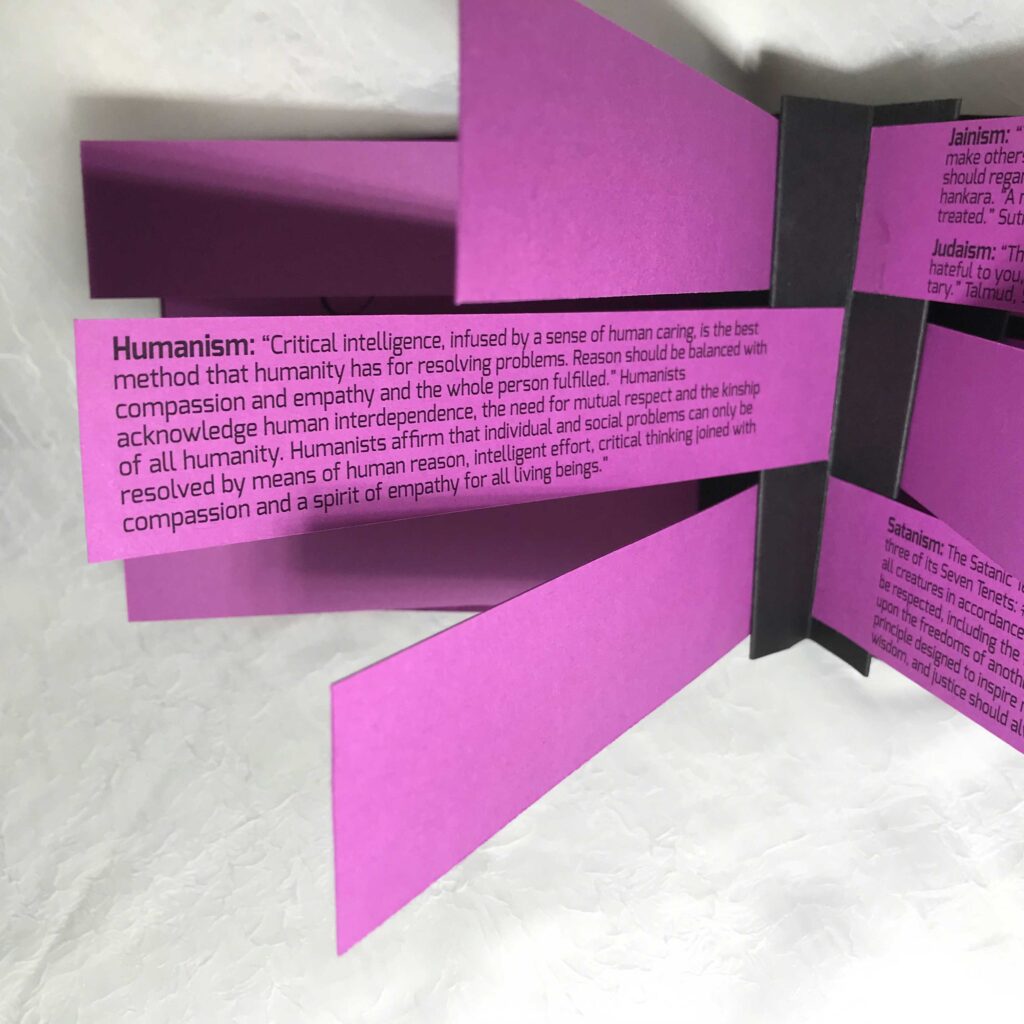This book was made in June 2020 in response to the prompt “Human” for the monthly Instagram community bookmakers challenge #areyoubookenough.
This is a purposefully simple book for a simple concept. The flag book structure, made with long overlapping flags, is also perfect for highlighting the coexisting, layered, and repetitive nature of the single most important human idea. The Golden Rule: Do Unto Others… Almost every religion, philosophy, and revered philosopher (34 are represented here) has a version of this ideal — how humanity should act towards one another, animals, and the planet, with care, compassion, and love. The title of the book (nestled in the Golden Ratio) is read in several ways as you get closer: Human, Human Kind, Human Be Kind. I was thrilled to discover that there is even an international Golden Rule Day. In these troubled, scary, and divisive times, I believe, that remembering the Golden Rule is more important than ever. Of course, after I completed the book my father informed me that we should more important be observing the Platinum Rule which is “Do unto others as they would wish done for themselves.” True.









Here is the list of all the quotes in the book.
Bahá’í Faith: “Ascribe not to any soul that which thou wouldst not have ascribed to thee, and say not that which thou doest not.” “Blessed is he who preferreth his brother before himself.” Baha’u’llah
“And if thine eyes be turned towards justice, choose thou for thy neighbour that which thou choosest for thyself.” Epistle to the Son of the Wolf.
Bakongo (aka Kongo people; an ethnic group found in West Africa): “If you see a jackal in your neighbor’s garden, drive it out. One might get into yours one day, and you would like the same done for you.”
Brahmanism: “This is the sum of Dharma [duty]: Do naught unto others which would cause you pain if done to you.” Mahabharata. From the Upanishads — the foundational document for Indian Brahmanism (circa 700 BCE): “Let no man to do another that which would be repugnant to himself; this is the sum of righteousness. A man obtains the proper rule by regarding another’s case as like his own.”
Buddhism: “A state that is not pleasing or delightful to me, how could I inflict that upon another?” Samyutta NIkaya. “Hurt not others in ways that you yourself would find hurtful.” Udana-Varga.
A statement by Gautama Buddha: He was the founder of Buddhism, which is the fifth largest religion
after Christianity, Islam, Hinduism, and Chinese traditional religion: “Resolve to be tender with the young, compassionate with the aged, sympathetic with the striving, and tolerant with the weak and wrong. Sometime in your life, you will have been all of these.”
Christianity: Bible verse: Matthew 7:12 from Jesus’ Sermon on the Mount: New International Version:
So in everything, do to others what you would have them do to you, for this sums up the Law and the Prophets.
Confucianism: “Try your best to treat others as you would wish to be treated yourself, and you will find that this is the shortest way to benevolence.” Mencius VII.A.4
Ancient Egyptian: “Do for one who may do for you, that you may cause him thus to do.” The Tale of the Eloquent Peasant, 109 – 110 Translated by R.B. Parkinson. The original dates to circa 1800 BCE and may be the earliest version of the Epic of Reciprocity ever written.
Hinduism: “This is the sum of duty: do not do to others what would cause pain if done to you.” Mahabharata 5:1517
Humanism: “…critical intelligence, infused by a sense of human caring, is the best method that humanity has for resolving problems. Reason should be balanced with compassion and empathy and the whole person fulfilled.” Humanists acknowledge human interdependence, the need for mutual respect and the kinship of all humanity. Humanists affirm that individual and social problems can only be resolved by means of human reason, intelligent effort, critical thinking joined with compassion and a spirit of empathy for all living beings.”
Incas: “Do not to another what you would not yourself experience.” Manco Capoc, founder of the empire of Peru.
Islam: “None of you [truly] believes until he wishes for his brother what he wishes for himself.” Number 13 of Imam “Al-Nawawi’s Forty Hadiths.” Hadiths are writings by Muhammad. There do not appear to be any verses in the Qur’an that explicitly state the Golden Rule.
Jainism: “Therefore, neither does he [a sage] cause violence to others nor does he make others do so.” Acarangasutra 5.101-2. “In happiness and suffering, in joy and grief, we should regard all creatures as we regard our own self.” Lord Mahavira, 24th Tirthankara. “A man should wander about treating all creatures as he himself would be treated.” Sutrakritanga
Judaism: “…thou shalt love thy neighbor as thyself.” Hebrew Scriptures (a.k.a. Old Testament) Leviticus 19:18 “What is hateful to you, do not to your fellow man. This is the law: all the rest is commentary.” Talmud, Shabbat 31a. “And what you hate, do not do to anyone.” Tobit 4:15.
Native American Spirituality: “Respect for all life is the foundation.” The Great Law of Peace.
“All things are our relatives; what we do to everything, we do to ourselves. All is really One.” Black Elk
“Do not wrong or hate your neighbor. For it is not he who you wrong, but yourself.” Pima proverb.
Roman Pagan Religion: Religio Romana is a modern-day Neo-pagan religion based on the religion of ancient Rome: “The law imprinted on the hearts of all men is to love the members of society as themselves.”
Satanism: The Satanic Temple has elements of the Golden Rule divided among three of its Seven Tenets: #1. “Strive to act with compassion and empathy toward all creatures in accordance with reason.” #4. “The freedoms of others should be respected, including the freedom to offend. To willfully and unjustly encroach upon the freedoms of another is to forgo your own.” #7. “Every tenet is a guiding principle designed to inspire nobility in action and thought. The spirit of compassion, wisdom, and justice should always prevail over the written or spoken word.”
Shinto: “The heart of the person before you is a mirror. See there your own form” Munetada Kurozumi “Be charitable to all beings, love is the representative of God.” Ko-ji-ki Hachiman Kasuga
Sikhism: “Compassion-mercy and religion are the support of the entire world.” Japji Sahib “Don’t create enmity with anyone as God is within everyone.” Guru Arjan Devji “No one is my enemy, none a stranger and everyone is my friend.” Guru Arjan Dev.
Sufism, the inner mystical dimension of Islam: “The basis of Sufism is consideration of the hearts and feelings of others. If you haven’t the will to gladden someone’s heart, then at least beware lest you hurt someone’s heart, for on our path, no sin exists but this.” Dr. Javad Nurbakhsh, Master of the Nimatullahi Sufi Order.
Taoism: “Regard your neighbor’s gain as your gain, and your neighbor’s loss as your own loss.” Tai Shang Kan Yin P’ien “To those who are good to me, I am good; to those who are not good to me, I am also good. Thus all get to be good.” “The sage has no interest of his own, but takes the interests of the people as his own. He is kind to the kind; he is also kind to the unkind: for Virtue is kind. He is faithful to the faithful; he is also faithful to the unfaithful: for Virtue is faithful.” Tao Teh Ching.
Unitarian Universalism: “The inherent worth and dignity of every person; Justice, equity and compassion in human relations…. The goal of world community with peace, liberty, and justice for all; We affirm and promote respect for the interdependent web of all existence of which we are a part.”
Wiccan: A modern Neo-pagan religion derived largely from Celtic sources. Their Wiccan Rede states: “An it harm no one, do what thou wilt” (i.e. do whatever you will, as long as it harms nobody, including yourself).
Yoruba: (Nigeria): “One going to take a pointed stick to pinch a baby bird should first try it on himself to feel how it hurts.”
Zoroastrianism: “That nature alone is good which refrains from doing to another whatsoever is not good for itself.” Dadisten-I-dinik, “Whatever is disagreeable to yourself do not do unto others.” Shayast-na-Shayast
Some philosophers’ statements are:
- Socrates: “Do not do to others that which would anger you if others did it to you.” (Greece; 5th century BCE).
- Plato: “May I do to others as I would that they should do unto me.” (Greece; 4th century BCE)
- Aristotle: “We should behave towards friends, as we would wish friends to behave towards us.” (This is a restricted version of the golden rule limited only towards friends. (Greece; 4th century BCE).
- Seneca, a Roman Stoic philosopher: “Treat your inferiors as you would be treated by your superiors,” Epistle to Lucilius 47:11 (Rome; 1st century CE)
- Epictetus: “What you would avoid suffering yourself, seek not to impose on others.” (Turkey, Rome, Greece; circa 100 CE)
- Thomas Hobbs: (England; 17th century CE) “When any one questions whether what he plans to do to another will be done in accordance with the law of nature or not, let him imagine himself in the other man’s place.”
- Kant: “Act as if the maxim of thy action were to become by thy will a universal law of nature.” (Germany; 18th century CE)
- John Stuart Mill: “To do as you would be done by, and to love your neighbor as yourself, constitute the ideal perfection of utilitarian morality.” (Britain; 19th century CE)
- Fred Rogers (1928-2003), star of the TV program “Mister Rogers’ Neighborhood”: “The three secrets of happiness are: Be kind, be kind, and be kind.”
